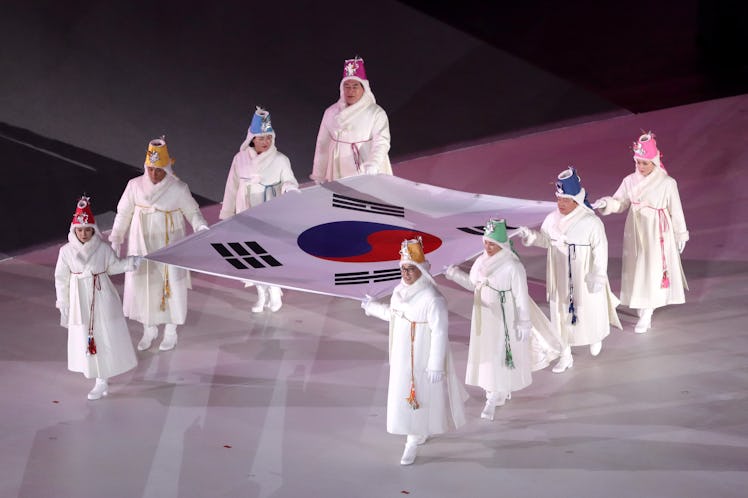
South Korea Is Hosting The Olympics, But They're Speaking French For A Pretty Simple Reason
For two weeks, PyeongChang, South Korea will play host to the 2018 Winter Olympics. So, some viewers of the Parade of Nations might be confused when they hear delegations from each country being introduced in different languages that are not, well, Korean. That begs the question: Why are they speaking French at the 2018 opening ceremony?
The answer is pretty simple.
The official languages of the International Olympic Committee are French and English, according to the Olympic Charter. That means that, no matter where any given Olympics is hosted, official announcements are made in three languages, French, English and the native language of the host country.
At the PyeongChang Olympics, that third language is, of course, Korean.
The only exception comes when a host country already uses one of the two official Olympic languages. So, when Los Angeles hosts the 2028 Summer Olympics, you can expect countries to be introduced during the Parade of Nations in just two languages, English and French.
The same happened in 2002 when, under the direction of former Republican presidential candidate Mitt Romney, Salt Lake City, Utah hosted the Winter Olympics. Only two languages were used at the 1996 Summer Olympics in Atlanta, the 2000 Summer Olympics in Sydney, and the 2012 Summer Olympic in London as well.
Meanwhile, the 2010 Winter Olympics in Vancouver brought about a special case: an Olympics in which a country had two official languages — Canada's are both English and French — that matched both of the Olympics' official languages.
The use of English and French are stipulated by Rule 23 of the Olympic charter. The first page of the charter bears a statue made in the image of Pierre de Coubertin, the founder of the modern Olympic Games. In the early 1900s, when de Coubertin revived the Olympics, which are inspired by competitions that were hosted by the ancient Greeks, he established French as the official language.
The Olympics are not unique in this regard. In fact, it's pretty common for governing bodies of international sports to have French roots. FIFA, the governing body that hosts the World Cup, is named such because of the organization's full name in French: Fédération Internationale de Football Association.
FIBA, the world's most prominent governing body for international basketball, gets its acronym from a French name, too: Fédération Internationale de Basket-ball.
Now, however, in the 21st century, French shows signs of being endangered at international competitions. That fact is not taken lightly by the International Organization of la Francophonie, an organization dedicated to, among other causes, representing Francophone countries and preserving the French language's prominence around the world.
At each Olympics, the organization appoints le Grand Témoin, a "great witness" who documents how French is being used by a host city.
"It’s a struggle each time you have the Olympic Games, in a different country and a different city," Michaëlle Jean, the group's secretary general, and great witness for the 2012 London Olympics, told The New York Times. "We must be there to make sure the French signs and documents and information are there. We have 3,000 athletes and a lot of people in the public from Francophone countries."
Despite the fact that French is the original language of the Olympics, and remains one of the two officials tongues at the games, it still lacks a presence at different the different sports venues that host competitions around a host city, Jean told The Times.
One area in which French is likely to never diminish, however, is at the opening and closing ceremonies, where the language has long been used to introduce countries during the Parade of Nations at Olympics past, present, and future.